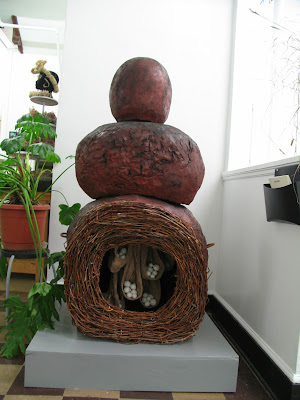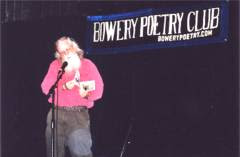
After a wild week of poetry in Lithuania, with lots of vodka and little sleep, I take the bus from Vilnius to Latvia, to Riga. How many hours - six, seven - I don't know. No one on the bus speaks English, I speak none of their languages, and I am alone.
At the border men with guns board the bus, take my passport, and motion me off the bus. Outside, they motion me to the side of the road. We cannot speak to each other. No one knows where I am. I don't know what they want. Eventually I understand that I am to walk through a trough full of a couple inches of liquid, soaking my shoes. No soil diseases crossing this border. I reboard the bus, my feet wet and smelling of chemicals. Latvia.
My hosts in Latvia have emailed me and told me to expect a different kind of week. They do not drink. They do not smoke. They do not eat meat. They have no car, no tv. They are poets.
I love the world, and everything in it.
My hosts are Janis Elsbergs and Ingmara Balode. I met Janis at the Vilenica poetry festival in Slovenia (where I also met Liudvikus from Lithuania). We spent a week with a group of poets traveling around Slovenia giving poetry readings, eating and drinking. A story for another time.
Janis comes from a literary "first family" in Latvia. His mother, Vizma Belsevica, was Latvia's leading woman writer of the 20th century, publishing poetry, novels, works for children, and translations (including Shakespeare, Poe, Twain, T S Eliot, Hemingway, Vonnegut and Tennessee Williams). Through her work she expressed her condemnation of the Soviet occupation of Latvia, leading to the banning of her work for seven years. Another of her sons, Klavs Elsbergs, was a poet and singer songwriter, singing about freedom, who met an early death, and whose murder was never investigated by the Soviet authorities.
Here is a poem by Vizma Belsevica:
Words come to me in a dream. They gath-
ered around like little scamps, whose mother
had been summoned by the militia to an-
swer for their mischief. And the soft lips of
the smallest and sweetest of them grew stiff
and began to quiver and it seemed, at any
moment now, he would cry,"I'll never do it
again." But he wasn't a crying word. And
so I said:
Words, my words, don't hang your heads, when once again
we're put on trial. The dock of the accused
is just a worn threshold to be trodden
for a world with no walls to begin. A land not a room.
There comes a time to hatch from the egg.
All birds know this. Even the hen.
This is known by the bird. The poet. And the word.
Even the ultimate sentence bringss a freedom
that cannot be revoked. If brushed by open air,
don't look back on the walls, your life.
Birds die. And poets. The blow of an axe
can't fell a word that's been said before death.
A word that's been spoken can't be annulled.
Like a swallow in the sky, it can't be run to ground.
Words, my words, spare your pity!
The ground that supports the harvest
is not to be pitied by the seed.
With no new shoots, no ploughshare, the soil grows thin.
Hack deeper, painfully, for new thought to thrive.
Come praise or punishment: it's not your worry.
When the poem is done, the gates between us close.
Go on alone. I brought you forth to life,
and take full responsibility,
Words, my words ...
translated by Mara Rozitis
and another poem by Vizma Belsevica:
At Peace
I say, at last, all is well.
But the rose sheds petals of blood,
what does that red stream sweep away?
I do not know. All is well.
I say, at last, I am at peace.
All that is left of the rose is a stalk
and a grey scatter of pollen. Were there tears?
I do not know. I am at peace.
I say, I expect nothing.
This greyness is so soft and slow.
Time hangs mute. The clock sleeps.
I don't expect anything.
My life grows thin and drifts away
a quiet smile, no more.
One day you'll walk right through me
and not notice.
Then all will be well.
(translated by Mara Rozitis)


















